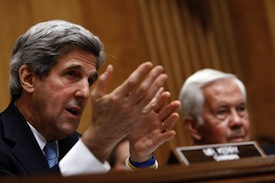Sen. Kerry: Reset with Russia Paying Off
June 23, 2010
Featured Image
Today's top nuclear policy stories, with excerpts in bullet form.
Stories we're following today, Wednesday, June 23, 2010:
The Merits of a Russian Relationship - Sen. John Kerry in Politico [link]
- One year ago, the Obama administration launched an initiative to “reset” relations with Russia. As Russian President Dmitri Medvedev lands in Washington Thursday, it’s clear that the outreach — which carried significant diplomatic and political risk — is paying off.
- New START is essential to building the habits of cooperation we hope to expand to the many global problems that Washington and Moscow share. That’s one reason former Defense Secretary James Schlesinger called Senate approval of START “obligatory.”
- The second major achievement of our outreach has been Russia’s increased cooperation in addressing Iran’s nuclear ambitions. Until recently, Russia opposed further sanctions. But we worked to convince Russia that the threat was genuine. Last month, Russian support was decisive in tipping the balance at the United Nations Security Council in favor of tough new sanctions. After that vote, Russia scrapped the sale of strategically crucial anti-aircraft missiles to Tehran. The benefits don’t end there...
- Survey the challenges of the next century — from the spread of nuclear weapons to energy security to Afghanistan — and it quickly becomes clear just how invaluable a Russian partner can be in solving them all.
Obama Aims to Build Economic Ties With Russia - Peter Baker of the New York Times [link]
- With an arms control treaty signed and sanctions against Tehran approved, Mr. Obama hopes this week to open a new phase intended to build the robust economic relationship that has eluded his predecessors.
- “It would be a game changer for Russia’s domestic development, rendering the economy more open and competitive, while integrating Russia more firmly in the international community,” said Anders Aslund, a Russia specialist at the Peterson Institute for International Economics.
- But expanding economic relations may prove harder than negotiating an arms treaty. Since the end of the cold war, every American president has talked about forging closer trade and investment ties with Russia, but with limited success.
- Mr. Obama has already revived a civilian nuclear cooperation agreement that could be lucrative to Russia, and he will have what Mr. McFaul called “a pretty serious discussion” with Mr. Medvedev about how to secure Russian membership in the World Trade Organization after 17 years of talks.
U.S. Says Iran Anxious As Sanctions Bite - Reuters [link]
- Private companies are increasingly working to avoid risky ties to Iran, a sign that tough new sanctions on Tehran's nuclear program have begun to bite, senior U.S. officials said on Tuesday.
- "Virtually all major financial institutions have either completely cut off or dramatically reduced their ties with Iran," Undersecretary of the Treasury Stuart Levey told a hearing of the Senate Foreign Relations Committee.
- "We are now starting to see companies across a range of sectors, including insurance, consulting, energy, and manufacturing make similar decisions," Levey said.
- Undersecretary of State William Burns said the new economic steps would "sharpen the choices" for Iran's leadership, and that the United States was open to talks on Iran's nuclear program if Tehran would address serious international concerns.
Iran Says Has Enriched 17 kg Uranium to 20 Pct Purity - Reuters [link]
- Iran has enriched 17 kg of uranium to 20 percent purity, a top official said on Wednesday, underscoring Tehran's determination to push ahead with its nuclear programme despite new international sanctions.
- Iran started refining uranium to 20 percent purity -- up from around 5 percent previously -- in February, saying it aimed to make fuel for a medical research reactor.
- "We have already produced 17 kg of 20 percent enriched uranium, and we have the ability to produce 5 kg each month but we do not rush," Ali Akbar Salehi, head of Iran's Atomic Energy Organisation, was quoted as saying by the ISNA news agency.
- Western analysts say Iran has exaggerated progress in the past to bolster domestic pride about its nuclear programme and to improve its bargaining position with major powers.
A View from the Dark Side
Conservative Leaders Oppose START Treaty - The American Spectator [link]
- The United States Senate should reject the New START treaty because it's a bad deal for America.
- Moreover, the Senate should refuse to even review the treaty until the release of the full negotiating record, which will provide lawmakers with insights into not only the official text, but also the course of discussions between the Obama Administration and the Kremlin.
- Sergey Kurginyan, a well-known hardliner, stated bluntly that "Russia could not have an easier partner on the topic of nuclear arms than Obama."
- Simply put, the United States should not be party to a treaty which does not benefit the United States.



